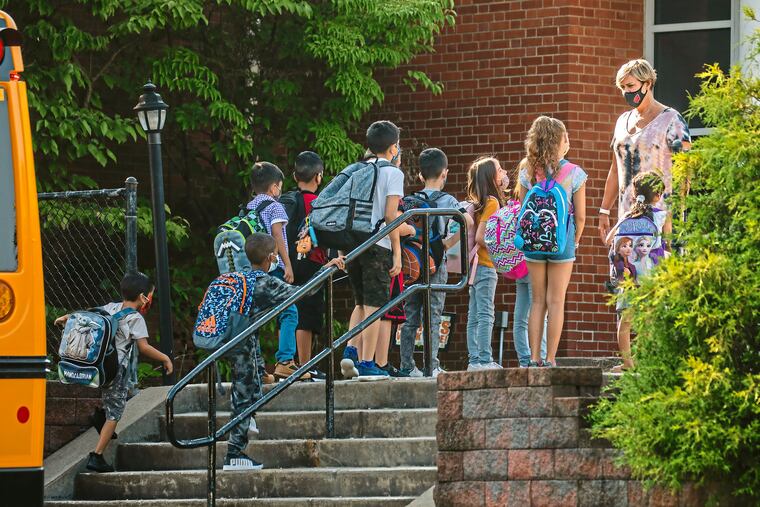Three Pa. bills to give parents more control over their kids’ education | Opinion
National school board protests underscore how helpless parents feel about having a voice in our children’s education.

As a devoted James Bond fan, I rushed to see No Time to Die. I don’t usually see much of my own life in Bond’s — but this time, I found him relatable. Why? While I would rather die (another day) than spoil the ending, I can say there were numerous times throughout the film where Bond found himself running out of options.
Minus the Aston Martin, that’s how I and many other parents feel after nearly two years of fighting the teachers’ union bosses and school district bureaucrats beholden to them. Shaken by our lack of options to have a voice in our children’s education, we’ve been stirred to action, as school board protests nationally show.
It shouldn’t be this much of a struggle for parents to have agency over our children’s future. But it is — and parents and kids are suffering because the money, and thus the power, in education is in the wrong hands.
Just look at what happened in September, when schools in Philadelphia — the district with the most low-achieving schools in the state — started shutting down again. Parents were once again left with little choice and fewer options.
» READ MORE: Who wants these jobs? This year has proven that being a school board member is truly thankless. | Michael Smerconish
At this point, we know the downsides of school closures: distance from friends, missing out on meals and physical activity, not to mention the still-unknown impact of our kids staring at screens for hours on end.
Thousands of at-risk students who had fallen far behind, especially those below grade 5, will likely now fall even further. As The Inquirer reported in July, Philadelphia has the second-largest racial gap nationwide for access to in-person learning.
Another school year like this could have economic consequences that hurt families for generations. As Allison Schrager of the Manhattan Institute recently reported, “Estimates from 139 countries indicate a year of schooling increases earnings by 9%.” We quite literally cannot afford school closures.
Meanwhile, parents continue to burn the candle at both ends. We’re losing work, losing sleep, and, as one CDC study showed, some are turning to drugs and alcohol to deal with this education crisis. For women, it’s putting our careers in jeopardy, with nearly two million women dropping out of the workforce. I don’t want another lecture from progressive lawmakers about how much their policies benefit women until they vote to empower us, especially those with lower incomes, to have agency over our children’s education.
Thankfully, some state lawmakers have taken note, sponsoring bills aimed at giving parents more options and power.
The Excellent Education for All Act (House Bill 1), proposed by State Rep. Andrew Lewis, would create universal Educational Opportunity Accounts (EOAs) allowing parents to use education tax dollars on qualifying purchases like tuition, online classes, tutoring, and special-needs services. HB 1 has education dollars following the child to the school of his or her family’s choice. Right now, only families with enough disposable income can have those options. HB 1 empowers all families, especially low income, to have choices.
State Sen. Judy Ward is sponsoring SB 733, which creates similar EOAs for special-needs students. State Rep. Natalie Mihalek will soon introduce a bill offering families Pandemic Relief Grants to offset the costs of switching schools during COVID-19.
Reforms like these have bipartisan support, with 82% of Democrats and 78% of Republicans favoring them. This is a signal to lawmakers that all parents prize flexibility and quality when it comes to their kids’ education. It’s critical lawmakers pass — and Gov. Tom Wolf signs — these bills.
If the last few months have shown us anything, it’s that parents will “never say die” when fighting for our kids’ future. Our kids deserve these options now — to this we will always return.
Jennifer Stefano is executive vice president of the Commonwealth Foundation. She is a visiting fellow at the Independent Women’s Forum. @JenniferStefano.